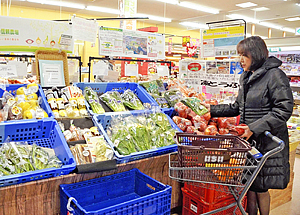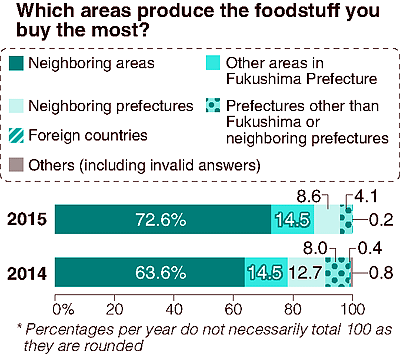Radiation tests reassure locals buying Fukushima products(検査信頼、地元産に戻る 福島県内消費者実態調査)

FUKUSHIMA― A total of 87.1 percent of consumers in Fukushima Prefecture said most of the foodstuffs they buy are produced in the prefecture, according to a survey by the Fukushima Federation of consumers' organizations.
県産農産物などの風評被害の把握を目的に、県消費者団体連絡協議会が県内の消費者を対象に昨年実施した実態調査で、「県内産の食材を最も多く購入する」と回答した人が87.1%に上ったことが分かった。
The federation, which released the survey in February, believes consumers' trust in the current inspection system is the reason behind the shift towards "local production for local consumption," as the percentage increased by nine points from the previous survey conducted in 2014. The survey shows that Fukushima consumers feel secure and safe knowing that radioactive contamination tests are conducted on locally produced foodstuffs. The survey was held to ascertain how agricultural and other items produced in the prefecture are being influenced by groundless fears among consumers.
同協議会が1日、調査結果を公表した。2014(平成26)年の前回と比べ9ポイント増加しており、同協議会は「放射性物質の検査体制への信頼から地産地消の傾向が強まっている」と分析。消費者も検査された県産食材に「安全・安心」を感じている。
Among those who favored locally produced foodstuffs, 72.6 percent said they prefer buying foodstuffs produced near where they live, up nine points from the previous survey. A total of 14.5 percent said they prefer buying foodstuffs produced elsewhere in the prefecture, the same level as in the previous survey.
県内産を最も多く購入するとした人のうち、居住地近くの地場産を購入するとしたのが72.6%で、前回比9ポイント増。そのほかの県産品を購入するとしたのは14.5%で、前回と変わらなかった。
Consumers in Fukushima Prefecture appear to trust the inspections.
"People are said to be worried about radiation, but the vegetables sold at supermarkets have been inspected," said Atsuko Saito, a company employee in her early 60s who was shopping in the vegetable section of a supermarket in Fukushima city. "For me, foodstuffs produced in the prefecture are safer to eat because they're properly checked." Saito bought a bunch of spinach from Fukushima Prefecture.
県内の消費者は実際に、検査への信頼を感じているようだ。福島市のいちいパワーデポ食品館で野菜を選んでいた同市の会社員斎藤敦子さん(62)は「放射能が心配と言われるが、店で売られているのは検査済みの野菜。ちゃんと検査している県内産の方が安心して食べられる」と本県産のホウレンソウを購入。
"I think locally produced food is more fresh because it takes less time to transport," said Mai Sato, another Fukushima city resident and nurse in her early 30s who was at the supermarket. "It's less expensive, too. I want to eat things produced nearby." Sato bought asparagus from the prefecture.
また同市の保健師佐藤舞さん(30)も「県内産の方が輸送に時間もかからず新鮮だと思う。値段も安いし、身近なものを食べたい」と本県産アスパラガスを手にした。
Many people want the current inspection system to be continued. Asked about the process that subjects whole bags of rice produced in the prefecture to inspection, 81.3 percent of respondents said they want "everything to be checked in the current manner." This result represents the feelings of people across Fukushima.
"It's not that consumers have overcome their anxiety. The current inspection system offers a source of reassurance," a federation staff member said.
ただ、検査体制の継続を望む声は強い。コメの全量全袋検査について「これまで通りすべて検査」を希望する人が81.3%を占めた調査結果が、県民の思いを裏付ける。同協議会は「消費者の不安がなくなったわけではなく、検査体制が安心材料となっている」とみている。
The survey was conducted in 26 municipalities from July to November last year. Among 1,300 questionnaires distributed, 1,214 consumers, or 93 percent, responded. Sixty-one percent of the respondents were 60 or older, and 73 percent were women.
調査は昨年7~11月に県内26市町村で実施。配布数1300枚に対し1214人が回答した(回収率93%)。回答者のうち、61%が60代以上で、73%が女性だった。

Promoting correct information outside Fukushima
In Fukushima Prefecture, people buy foodstuffs produced locally. However, the Fukushima Federation of consumers' organizations says it is critical to spread correct information outside the prefecture.
県外に正しい情報発信必要
県内では県内産食材が購入される一方、同協議会は、県外への正しい情報発信の必要性を課題に挙げる。
This is because the results differed in the latest survey and in a Consumer Affairs Agency survey conducted in eastern Japan in August last year. The agency asked the same question: "How do you feel about the risk involved with doses of radiation so low that their effect on people's health cannot be confirmed?"
消費者庁が昨年8月に東日本で実施した実態調査と同じ「放射線の健康影響が確認できないほど低線量のリスクをどう受け止めるか」との設問で、今回の調査と正反対の傾向が見られたからだ。
In the latest survey by the federation, 16.1 percent of pollees said responded that it was "not acceptable even if the dose is within the threshold" ? down two percentage points from the previous survey. A total of 74.8 percent of respondents responded that it was "acceptable" or "don't care"? up 6.3 percentage points from the previous survey.
The Consumer Affairs Agency survey found 21.2 percent of respondents said such risk was "not acceptable" an increase of 1.6 percentage points from the previous survey. In the same poll, 47.2 percent respondents chose answers similar to "don't care," a decrease of 8.6 percentage points from the last time.
県民対象の今回調査では「基準値内でも受け入れられない」と回答した人が16.1%で前回比2ポイント減、「受け入れられる」「気にしない」とした人が74.8%と同6.3ポイント増となったのに対し、消費者庁調査では「受け入れられない」が21.2%で同1.6ポイント増、「気にしない」などとしたのが47.2%で同8.6ポイント減となった。
The federation believes people living outside the prefecture may have erroneous information on the radiation issue.
( Translated by The Japan News )
同協議会は「(誤った情報を持ったまま)県外の関心が薄れている可能性がある」としている。
【 2016年2月2日・本紙掲載 】
- Futaba Post Office reopens after 13 years(双葉郵便局、13年ぶりに再開)
- Craft sake brewery to make unmanned station more welcoming(無人駅の「クラフトサケ」醸造所がお出迎え)
- New Kitakata ramen developed to appeal to foreign tourists(訪日客向けの喜多方ラーメン開発)
- Aizu-Wakamatsu students come together with teahouse project(会津若松の生徒、茶室プロジェクトに集結)
- New hotel to be symbol of reconstruction(復興のシンボルとなる新ホテル)
- Radiation-resistant cameras to be produced in Fukushima(耐放射線カメラ、福島県で生産へ)
- International flights to Fukushima to resume after 13-year hiatus(福島の国際定期便、13年ぶり再開へ)
- Fukushima association to create base for parents of children with disabilities(障害児の親へ拠点作り)
- Real shell mound from Jomon period goes on display in Minami-Soma(南相馬で縄文のリアル貝塚展示)
- Japanese man opens restaurant to provide free meals to residents of war-hit Ukraine city(日本人男性が戦禍のウクライナに無料レストラン開店)